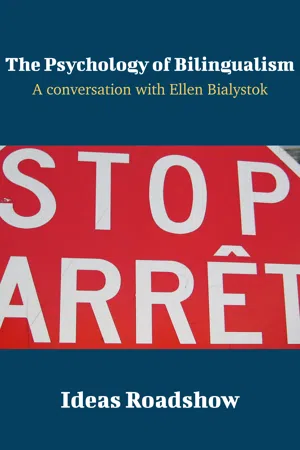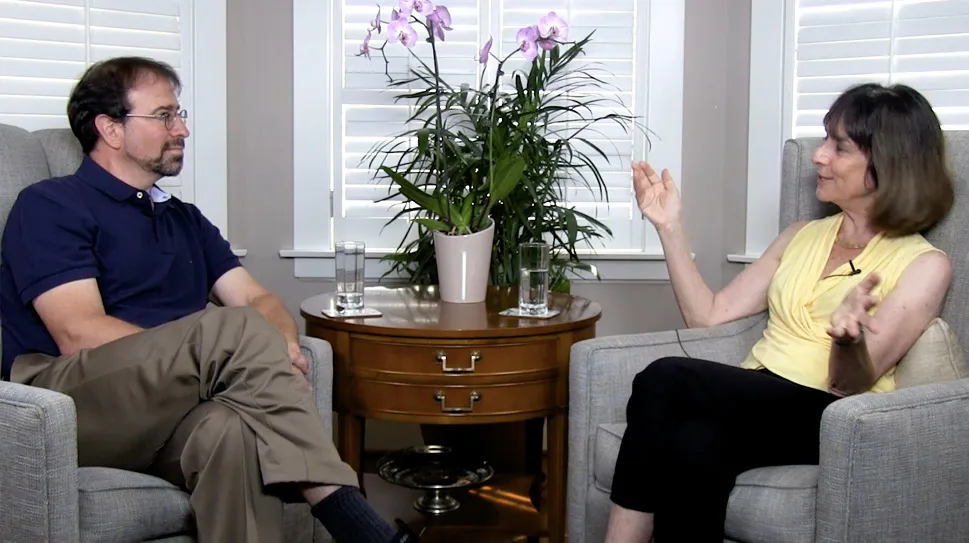![]()
The Conversation
![]()
I. Focusing on Bilingualism
From pedagogy to battling stereotypes
HB: How did you get involved in bilingualism research? How did that start for you?
EB: It was a natural extension of the research I was doing. In research, you don’t really know where it’s going to lead. One things leads to another and then you follow up the questions that are left over.
I was studying language and cognitive development in children. That’s what I did for my graduate work. I was interested in how children learn language and how that connects up with their developing cognitive systems, and things evolved naturally from there.
When I graduated, I ended up working on a project that looked at second language learning in high school classrooms, something there was very little research on at the time. This was the 1970s. Kids were learning languages in high school and nobody was really paying much attention to it.
HB: What were you looking at, exactly—how quickly kids were able to pick up another language?
EB: This was in Ontario, so we were looking at kids learning French in school. Is there any point to it? Does it do anything for them? Do they actually learn French? Does anything actually happen?
It was part of a large-scale project that examined matters very much from a pedagogical perspective. It was housed in the Faculty of Education, and the questions all had a natural educational orientation: How should we teach language? What are effective strategies for teaching? What are effective strategies for learning?
It was all very much at the level of pedagogy—which was something I knew nothing about, by the way. But I knew something about language, and I knew about aspects of language development in children, so I was hired to manage a part of that project.
HB: And what did you find out?
EB: We found out almost nothing, as it happens. Many of these big, pedagogical questions had no real answers of the sort they were looking for—a kind of one-size-fits-all answer.
HB: But were there not even micro-results? Something along the lines of, If you do this particular thing on a regular basis with this built-in control group, this tends to work statistically better than that? There was nothing at all?
EB: Nothing of any interest, except that some kids were learning French and some kids weren’t—but that, in itself, is interesting.
There was also, at the time, a wider interest (including the group I was working with) in discovering what they were calling the “good language learner”. Some people claim to know 26 languages, all fluently, and some people cannot learn to say ‘bonjour’. They cannot do it. Their whole being rejects that. So what’s going on here?
There were a few studies that tried to figure out what it is that enables some people to be good language learners, as opposed to others. Again, those studies didn’t show much, but I now actually have an opinion on this.
I have a very holistic view of the mind, brain, and ability. In my view it’s dead simple: everybody’s good at some stuff and bad at some stuff. Just like every other activity, learning a language is a kind of talent. Some people are very good at physics, or math, or music, or dance, or sports, and some people are very good at language. We all have some sort of an ability profile, and if you link up ability with interest, motivation, and opportunity, you’ll learn language. I think it’s pretty much that simple.
HB: Of course, we all learn language. There’s a question about how much of it is innate and how much of it is learned, but there’s clearly a large, innate component to being able to learn language.
EB: Well, in some sense, everything we learn is innate because we are innately prepared to learn it. But I would put this question out there: do we all learn our first, and perhaps only, language in the same way, to the same level, with the same degree of proficiency? I don’t think so. We’re not all poets. Everything is distributed. Some people just love language and they learn it easily—they eat it for breakfast. If you give them more languages, they’ll eat more breakfast. And some people end up being pretty rudimentary in their linguistic abilities. Even there, there’s a distribution, I think. Of course, we’re wired to learn language. That doesn’t mean the content of language is innate. It means the ability to learn this content is innate.
HB: Getting back to your story, you were doing these pedagogical studies, and recognized that they were somewhat less than ideally efficacious. What happened after that?
EB: Well, what that did was introduce me to this world of, at that time, pretty nascent research in second language acquisition. Within that very small area of research, there was an even more nascent crumb that looked at second language acquisition from the perspective of psychology. I thought, Well, now I’m on to something, because I was trained as a psychologist, so I just gravitated to that. There were a few people—a very small number of people whom I could name on one hand—who used the methods of psychology to look at these questions in more detail. And I became one of those people.
We started asking questions about this from the perspective of psychology. What’s the mind doing when you’re learning another language? What’s happening to the language you already know? How do they live together? Does something else change? How can we, as adults, take on a whole new way of speaking?
These are psychological questions, not pedagogical questions. There were a small number of us who started asking those questions.
Finally, not only was I trained as a psychologist, I was trained as a developmental psychologist. So I ended up asking those questions from the perspective of children’s development.
HB: By children, you mean mostly younger children?
EB: Yes—at first, mostly younger children. That set out the first stage of my research: what happens to children’s language and cognitive abilities when they are learning or have been exposed to two languages in the home?
HB: You had written in one of the review papers that, up until the early 1960s, there was a prevailing societal view that children who were bilingual, or at least had competency in two languages, had all sorts of negative, developmental aspects associated with them as a result, and it wasn’t until this famous study—
EB: Peal and Lambert in 1962.
HB: Right—that some serious research started to be done to correct our understanding.
But first: where did this notion come from: that people were somehow developmentally handicapped by having two languages?
EB: I think it came from two places. The first is that people are afraid of language, and the second is racism. The combination of these things was lethal.
I should add that, even though the conclusion was pretty terrible—“languages are bad”, “protect your children from other languages”; these are the kinds of things people would say—there was a little bit of research that fed right into that conclusion. This research had been done with the best of all intentions, except that it was badly done and it came out with the wrong results.
At any rate, people are afraid of languages, especially in North America (much less so in Europe, though Europeans are not immune to these attitudes). But certainly in North America; and particularly in the 1950s when all of this was becoming popular belief, people thought, Language is very hard. I’m so glad my child is learning to speak English on schedule. I’m not going to mess with that and confuse them with another language, because we know that, when we look at kids who have to speak two languages, they just mix them all up and they don’t know which language they’re speaking. It’s too hard and I’m going to protect my child.
Everybody wants the best for her child. So this was an honestly motivated, w...

